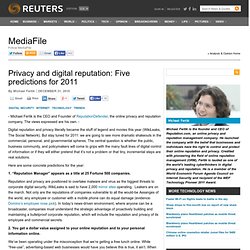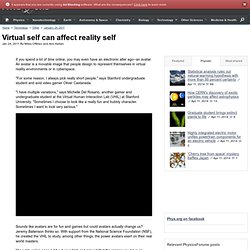

Privacy and digital reputation: Five predictions for 2011. - Michael Fertik is the CEO and Founder of ReputationDefender, the online privacy and reputation company.

The views expressed are his own. - Digital reputation and privacy literally became the stuff of legend and movies this year (WikiLeaks, The Social Network). But stay tuned for 2011: we are going to see more dramatic shakeouts in the commercial, personal, and governmental spheres. Here are some concrete predictions for the year: 1. Reputation and privacy are positioned to overtake malware and virus as the biggest threats to corporate digital security. 2. We’ve been operating under the misconception that we’re getting a free lunch online. Personal information online will also have a dollar value. 3. In 2010, 10.9 billion mobile apps were downloaded. 4. We’ve seen hints of it already: insurance companies are researching social media data for premium and coverage purposes. 5. The cat’s out of the bag: facial recognition is getting smarter at a geometric rate.
Internet Statistics & Social Media Usage. Choose your friends carefully: the move to Social Network Curation in 2011 » GfK TechTalk. Our online social networks are a key source of information and increasingly influence what we read, share and buy.

However, if we do not filter out the mundane we risk missing the information that is most important to us and becoming a victim of information overload. It occurred to me the other day that I have too many friends. By this, I don’t mean the family, friends and colleagues I socialise with throughout the week and, you know, actually spend my leisure time with face to face. More, the numerous people sitting on my Facebook account I haven’t spoken to for nigh-on five years, (the occasional shallow digital platitude aside), but who seem intent on breathlessly updating their minute movements on the notice board whenever I (increasingly infrequently) log-in. Back in 2006 when the Facebook really took off, there was something ego-boostingly satisfying about racing to my first 100 friends, but now I find it a little tiring.
[ii] Interview in “The Word”, Issue 95, January 2011 [vi] Virtual self can affect reality self. If you spend a lot of time online, you may even have an electronic alter ego--an avatar.

An avatar is a movable image that people design to represent themselves in virtual reality environments or in cyberspace. "For some reason, I always pick really short people," says Stanford undergraduate student and avid video gamer Oliver Castaneda. "I have multiple variations," says Michelle Del Rosario, another gamer and undergraduate student at the Virtual Human Interaction Lab (VHIL) at Stanford University.
"Sometimes I choose to look like a really fun and bubbly character. Sometimes I want to look very serious. " Sounds like avatars are for fun and games but could avatars actually change us? "As a lab, we've gone a bit out on a limb and argued that the reason you have an avatar is because an avatar makes you more human than human. "Remember, in the virtual world--height, beauty--these things are free. Bailenson gives another example. Your avatar also may affect your fitness.